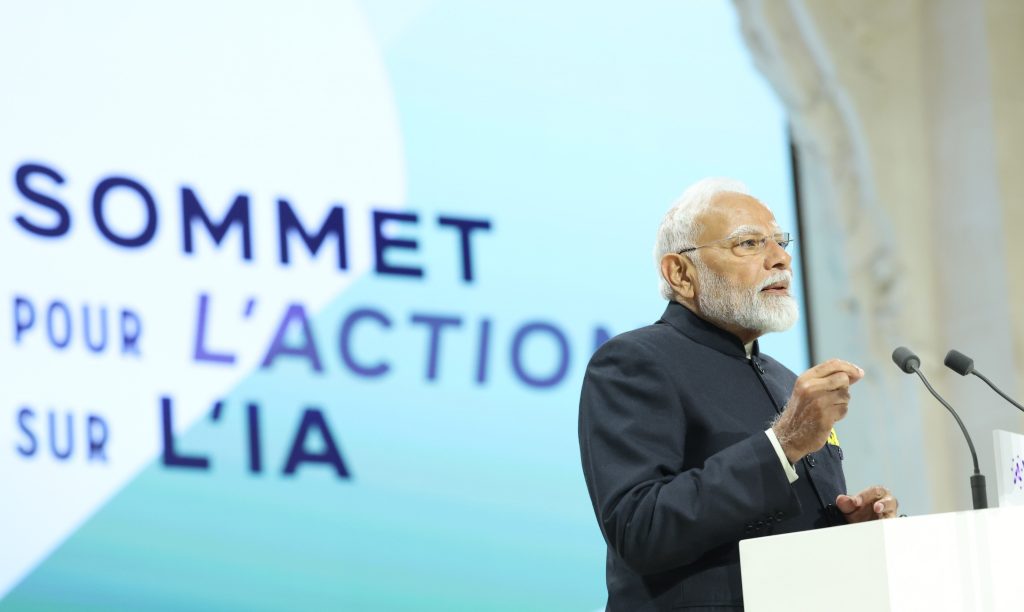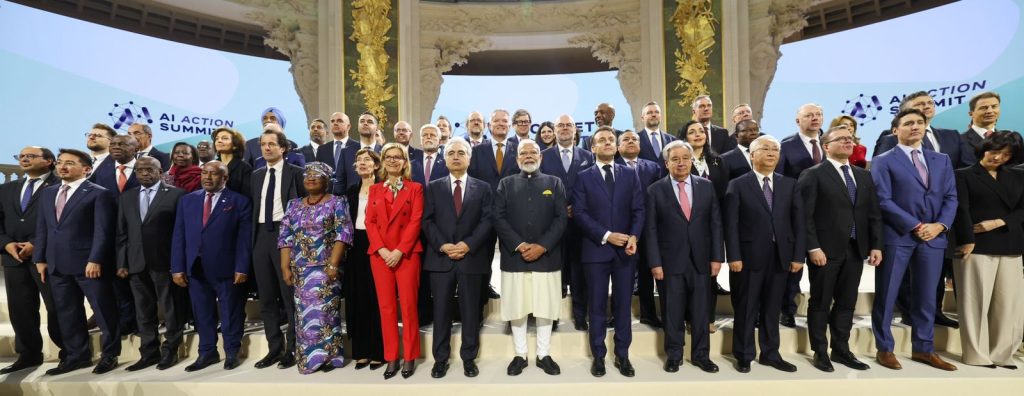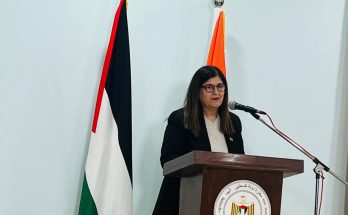
By Shweta Aggarwal
PARIS/NEW DELHI: Unveiling his vision of sustainable and smart AI as “global public good,” at the AI Action Summit in Paris on February 11, Prime Minister Narendra Modi called for democratising technology and ensuring access to AI for the Global South.
Addressing global leaders at the majestic Grand Palais, PM Modi underlined that that “the world was at the dawn of the AI age where this technology was fast writing the code for humanity and re-shaping our polity, economy, security and society.” Co-chairing the AI summit with French President Emmanuel Macron, PM Modi called for collective global efforts to establish governance and standards that uphold shared values, address risks and build trust.
Alluding to India’s AI Mission, PM Modi highlighted that India, considering its diversity, was building its own Large Language Model for AI. He underlined that India was ready to share its experience to ensure that the benefits of AI reach everyone. Mr Modi announced that India will be hosting the next AI Summit.
The summit featured discussions on critical themes, including greater access to AI infrastructure to ensure inclusion, the responsible use of AI, AI for public interest, making AI more diverse and sustainable, and ensuring safe and trusted governance of AI.
 The High-Level Segment of the AI summer began with a dinner hosted by President Emmanuel Macron at the Élysée Palace on February 10, which brought together Heads of State and Government, leaders of international organizations and CEOs of major AI companies. US Vice President J D Vance, UN Secretary-General Antonio Guterres, European Commission President Ursula von Der Leyen and Canadian PM Justin Trudeau were among others who attended the AI summit.
The High-Level Segment of the AI summer began with a dinner hosted by President Emmanuel Macron at the Élysée Palace on February 10, which brought together Heads of State and Government, leaders of international organizations and CEOs of major AI companies. US Vice President J D Vance, UN Secretary-General Antonio Guterres, European Commission President Ursula von Der Leyen and Canadian PM Justin Trudeau were among others who attended the AI summit.
Allaying apprehensions that loss of jobs is AI’s most feared disruption, PM Modi called for “investing in skilling and re-skilling our people for an AI-driven future.”
“History has shown that jobs do not disappear due to technology. Its nature changes, and new types of jobs are created,” he said.
“The core idea underpinning PM Modi’s speech was that the world needs to collaborate proactively to shape an inclusive AI that is accessible to all. In particular, he focused on sharing AI expertise and technology with countries of the Global South,” said Manish Chand, CEO, Centre for Global India Insights, a think tank focused on global affairs. “Going forward, PM Modi’s overarching message to the world was that India will play a pivotal role in shaping AI-driven future,” said Chand, author and editor, “Shaping India’s G20 Legacy: Shaping a New World Order.”
Excerpts from PM Modi’s speech at the AI summit
Some people worry about machines becoming superior in intelligence to humans, but no one holds the key to our collective future and shared destiny other than us humans. That sense of responsibility must guide us.
AI is developing at an unprecedented scale and speed, and being adopted and deployed even faster. There is also a deep interdependence across borders.
Governance is not just about managing risk and rivalry. It is also about promoting innovation and deploying it for the global good. So, we must think deeply and discuss openly about innovation and governance. Governance is also about ensuring access to all, especially in the Global South. It is where the capabilities are most lacking, be it compute power, talent, data, or the financial resources.
AI can help transform millions of lives by improving health, education, agriculture and so much more, it can help create a world in which the journey to Sustainable Development Goals becomes easier and faster.
To do this, we must pull together resources and talent. We must develop open-source systems that enhance trust and transparency. We must build quality data sets, free from biases. We must democratise technology and create people-centric applications. We must address concerns related to cyber security, disinformation and deep fakes. And we must also ensure that technology is rooted in local ecosystems for it to be effective and useful.
There is no doubt that the high energy intensity of AI needs to be looked into. This will require green power to fuel its future.
AI models must also be efficient and sustainable in size, data needs and resource requirements. After all, the human brain manages to compose poetry and design spaceships using less power than most light bulbs.
India has successfully built a digital public infrastructure for over 1.4 billion people at a very low cost. It is built around an open and accessible network, it has regulations and a wide range of applications to modernise our economy, reform governance and transform the lives of our people. We have unlocked the power of data through our data empowerment and protection architecture, and we have made digital commerce, democratic and accessible to all.
Author Profile
- India Writes Network (www.indiawrites.org) is an emerging think tank and a media-publishing company focused on international affairs & the India Story. Centre for Global India Insights is the research arm of India Writes Network. To subscribe to India and the World, write to editor@indiawrites.org. A venture of TGII Media Private Limited, a leading media, publishing and consultancy company, IWN has carved a niche for balanced and exhaustive reporting and analysis of international affairs. Eminent personalities, politicians, diplomats, authors, strategy gurus and news-makers have contributed to India Writes Network, as also “India and the World,” a magazine focused on global affairs.
Latest entries
 DiplomacyJanuary 5, 2026India walks diplomatic tightrope over US operation in Venezuela
DiplomacyJanuary 5, 2026India walks diplomatic tightrope over US operation in Venezuela India and the WorldNovember 26, 2025G20@20: Africa’s Moment – The Once and Future World Order
India and the WorldNovember 26, 2025G20@20: Africa’s Moment – The Once and Future World Order DiplomacyOctober 4, 2025UNGA Resolution 2758 Must Not Be Distorted, One-China Principle Brooks No Challenge
DiplomacyOctober 4, 2025UNGA Resolution 2758 Must Not Be Distorted, One-China Principle Brooks No Challenge India and the WorldJuly 26, 2025MPs, diplomats laud Operation Sindoor, call for national unity to combat Pakistan-sponsored terror
India and the WorldJuly 26, 2025MPs, diplomats laud Operation Sindoor, call for national unity to combat Pakistan-sponsored terror







